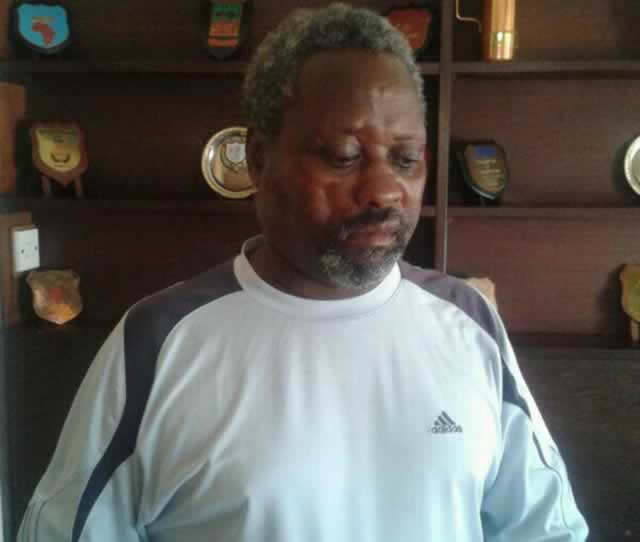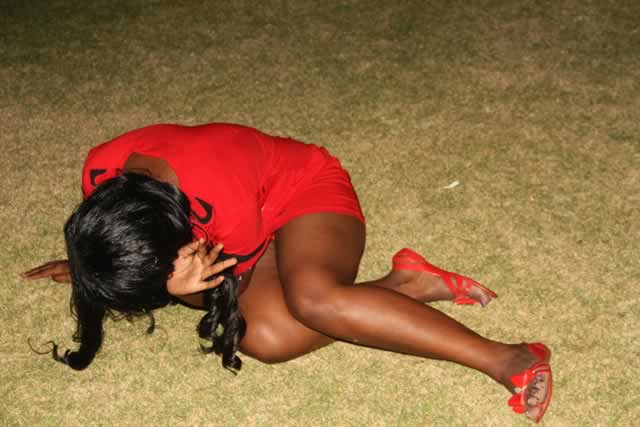Kwashi soldiers on


Steve Kwashi poses for a photo at home with some of the awards he won during his career showing in the background
Eddie Chikamhi Lifestyle Reporter
A PERSON’S dreams can be shattered in a matter of seconds. Such is the stubborn fact of life that no one can run away from. We all have dreams and hopes on how we want our lives to be but nature has a way of deferring events, at times for the worst.
The victors in the end are those that pick themselves up and soldier on.
Such is the life story of a man who made an impact on the face of local football.
When we talk about the best coaches of the Good Old Days of the 1990s it is hardly possible not to mention the name Steve Kwashi.
This is the man who led clubs like Black Aces and CAPS United to glory before his coaching career was cut short by debilitating injuries sustained in a car accident in 2001.
Kwashi has been down and out, thenceforth, with permanent physical disability. He has had to rely upon his family for support all the years as he struggled for speech and other routine physical activities like walking.
Touched by the plight, his daughter Shungu has decided to start a day centre for people living with acquired disabilities, including brain injuries.
Kwashi was involved in a horrific accident that saw him going into a comma for close to seven months and experiencing memory loss when his car veered off the road and hit a tree on his way from a league match in Hwange.
Shungu has witnessed how her father’s life took a down turn following that tragedy. Kwashi was, in his own words, born a sportsman and football has always been his life. But that has all changed. The misfortune has prompted the daughter to start a project aimed at helping people in the same predicament.
“My father was an active sportsman. That has been his life and apart from that there was nothing else. He could still be involved in such things but with his condition it’s no longer possible.
“So how do you help such people?” said Shungu.
“His life now is quite a monotonous one. He wakes up in the morning every day, does a 40 minute walk and comes back home and there is nothing more to do for the rest of the day.
“Really there is nothing much to keep him occupied and that hasn’t helped him in any way to get better. Instead, if possible, he needed to be exposed to sports activities again, or anything like that, even at a low level. The bottom line is to find something that can stimulate his mind.
“My mother has been taking care of him all the time but she also has other work to do. I realise that they are many people in similar conditions and I looked around Harare to see if there is any place to take care of victims of such circumstances and found none.
“So we are starting a day centre for adults living with acquired physical disabilities. For people who would have been born without a disability but acquire the disability at some stage in their lives due to accidents, strokes, hypoxia or substance abuse,” she added.
The project, named Acquired Disability & Brain injury Network/Day Centre, was registered at the Deeds Office last week and is expected to be operational by January.
The centre will give the victims and caregivers a platform to socialise, share information and develop support networks. There will also be leisure activities like sports, arts, reading, group discussions, games and the provision of audio-visual educational materials.
“These people normally would have gone through rehabilitation after the trauma which would have caused their disability.
“For those whose disability is severe this results in adverse life changes for the person that is social isolation, medical retirement from work, decreased functional ability, and unstructured time loss of self-esteem.
“If family members hold jobs or attend school this leaves the care giver as the sole contact day in and day out for the person with a disability.
“Should a family member be the care giver, many a time relationships are strained over time because of the inability of the family to have respite breaks even just for a few hours,” said Shungu.
This day centre will also benefit past and patients of rehabilitation centres across the city (St. Giles, Athol Evans, or Ruwa Rehabilitation) who because of their disability have never left their homes since discharge because of the unavailability of facilities or lack of ideas on how to stimulate and enrich the lives of the family member with a disability and at the same time also creating breaks for the care givers.
Shungu said the centre will be beneficial to many people in Harare living with an acquired disability and no longer live a meaningful life because their disability has pushed them out of work or school.
“Stimulating their minds could help especially those with acquired brain injury to possibly regain their memory or get better as opposed to when they just sit at home with nothing to do.
“The Day Centre will run along similar lines as senior citizens clubs although activities will be structured taking into consideration whether the group will be for therapeutic, socialisation or recreational purposes. Other factors to be considered will be age, disability and interests,” said Shungu.








Comments